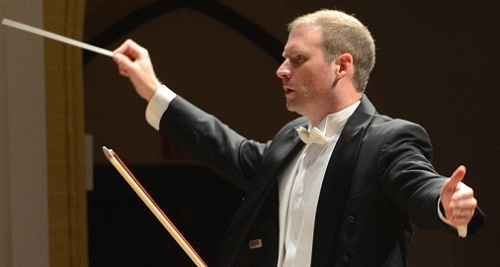Boston Cecilia brings vocal luster to seasonal program
Boston Cecilia and music director George Case welcomed the Christmas season with a program Friday night at Boston’s Church of the Advent.
The concert was built around Morten Lauridsen’s Lux Aeterna. Written in 1997, the score sets parts of various Latin texts (the Requiem liturgy, “Te Deum,” “O Nata Lux,” and “Veni, Sancte Spiritus”) in Lauridsen’s words, to “enrich and enlighten the lives of both performers and listeners in some way.”
A vague sentiment, perhaps, but Lux Aeterna has clearly found sympathy with both groups over the past two decades, and it’s not hard to see why. Lauridsen’s musical language is diatonic and lyrical, with familiar gestures and forms (canons, hymns, etc.), and his use of dissonance can be striking, but always resolves satisfyingly.
Boston Cecilia’s performance on Friday was lush and poignant. Case thoughtfully shaped each of the five connected movements, which resulted in a strong sense of direction over its half-hour duration. Organist Kevin Neel executed his complex part with vigor and sensitivity.
Throughout, the choir’s sound was full-bodied but impressively flexible. The Cecilia dug in to the hymn-like strains of the first and fourth (“Veni, Sancte Spiritus”) movements and the finale’s apotheosis was aptly stirring. The singers’ account of the third movement (“O Nata Lux”) was warm and noble, while the second’s contrapuntal figures were cleanly etched.
Framing the Lauridsen were three pieces that seemed strongly influenced by its diaphanous textures.
First were a pair of short works by Eric Whitacre. His hope, faith, life, love sets e.e. cummings’ eponymous poem while also referencing a series of Whitacre’s earlier choral pieces. It features arresting moments – shimmering clusters on the word “hope,” short melismas on “joy” – yet doesn’t quite add up to more than the sum of its parts.
Lux Aurumque (“Light and Gold”) is rather more conventional and substantial, a meditation on Charles Anthony Silvestri’s poem about angels serenading the new-born Christ.
In both scores, the Cecilia sang with fine balance and excellent intonation. The group’s outermost sections shone particularly bright in Lux Aurumque: the sopranos floated their opening, top-most notes with radiant purity, while the basses robustly intoned the low-lying, closing “modo natum.”
On the other side of the Lauridsen came Ola Gjeilo’s Serenity, a setting of the Christmas chant “O Magnum Mysterium” for choir and cello. At the beginning, voices provide a homorhythmic accompaniment to the cello’s melody; gradually, all parts become more lyrically involved.
Shay Rudolph was Friday night’s capable cellist and the Cecilia ensemble sounded lustrous, even if the piece didn’t leave a lasting impression.
More distinctive were the evening’s selections from the British Isles.
James MacMillan’s mellifluous 2007 antiphon, “O Radiant Dawn,” was sung with rich tone and delicate textural shadings.
The same could be said for Ralph Vaughan Williams’ Fantasia on Christmas Carols. A 1912 arrangement of four English folk hymns/carols, it’s a charming piece, full of strong (sometimes familiar) tunes, all smartly woven together.
Friday’s performance was taut, the Cecilia rendering their parts with color and spirit. Cellist Rudolph’s solos were burnished and Neel brought a ruddy, Anglican glow to the organ part. Baritone John Bitsas sounded a bit worn when singing softly in his upper register but he rallied for the piece’s stronger moments (“Come all you worthy gentlemen” and “God bless the ruler of this house,” in particular).
Also fine was the night’s closer, Sydney Guillaume’s Dominus Vobiscum. Employing a Haitian Creole text that ruminates on the Latin phrase “The Lord be with you,” it’s a piece that balances lyricism and rhythmic drive in almost equal measure.
Case and the Cecilia brought crisp articulation to its pulsing refrains, while also imbuing the score with a welcome feeling of spiritual catharsis.
The program will be repeated 3 p.m. Sunday at All Saints Parish in Brookline. bostoncecilia.org
Posted in Performances
